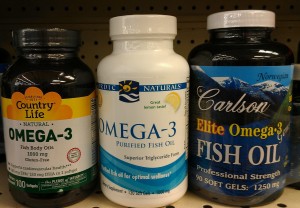
Taking large amounts of omega-3 essential fatty acid supplements may have negative health consequences.
Do you take fish oil supplements? What about foods fortified with omega-3 essential fatty acids, such as eggs, bread, juice, soy milk, yogurt, and butter substitutes? If so, you may want to take a careful look at your overall diet and reconsider how many omega-3 fatty acids you are consuming on a daily basis, because taking too much may do more harm than good according to a recent article published by Oregon State University (OSU).
Fish oil supplements have long been considered an excellent way to fight inflammation and protect cardiovascular health, but a review study done by Dr. Hord of OSU’s College of Public Health and Human Sciences and Jennifer Fenton from Michigan State University, suggests that over-supplemenation of omega-3 essential fatty acids, which are also known as long chain polyunsaturated fatty acids (LCPUFAs), negatively alter immune function. Unfortunately, the bad news doesn’t stop there. The OSU article also pointed out that past studies have shown that individuals with high amounts of LCPUFAs in their system were more prone to colitis, prostate cancer, and atrial fibrillation.
The authors explain that the main concern is for individuals who may be consuming super high amounts of omega-3 fatty acids from excessive supplementation and fortified food intake, not necessarily for those taking supplements within suggested normal guidelines. Also, the authors noted that more research needs to be done to establish dietary guidelines based on biomarkers, since how much can be consumed may vary depending on several factors.
Therefore, in the meantime, it seems not going crazy with omega-3 supplementation would be wise! Skip the supplements and omega-3 fortified foods and focus on eating whole foods naturally rich in omega-3 fatty acids instead. The study authors support the American Heart Association’s recommendations to eat fish high in omega-3s (i.e., salmon, lake trout, sardines, etc.) a couple times a week, but there are definitely other foods to consider. Here are some great options according to this Discovery Fit & Health article, “Top 10 Foods High in Omega 3s“:
- Beans, specifically black and kidney beans
- Dairy products from pasture-fed animals
- Chia seed
- Edamame
- Pasture-fed beef
- Wild rice
- Walnuts
In other words, focus on eating a balanced, whole-foods diet for your nutritional needs. Nutrients are more easily absorbed from foods than supplements. Also, you don’t need to worry about throwing any one particular nutrient out of balance by taking too much of it in supplement form. That being said, omega-3 fatty acids are considered essential to our health and wellness. Our bodies can’t make them on their own. Plus, they support overall cell health, decrease inflammation, which is a major cause of several diseases, keep bad cholesterol in check, and help in many other ways as well. So, what do you think? Are fish oil supplements worth taking? Friend or foe?
Copyright © Karen Peltier and Well Gal, 2013. All rights reserved.
Photos © Karen Peltier and Well Gal, 2013
